Key takeaways
- Public hearings empower community members to voice concerns and influence local governance.
- Preparation, including understanding the agenda and crafting a statement, enhances confidence when speaking.
- Active participation fosters transparency and engagement, leading to meaningful change in policies.
- Listening to diverse opinions and sharing personal stories strengthens community connections and impacts decision-making.
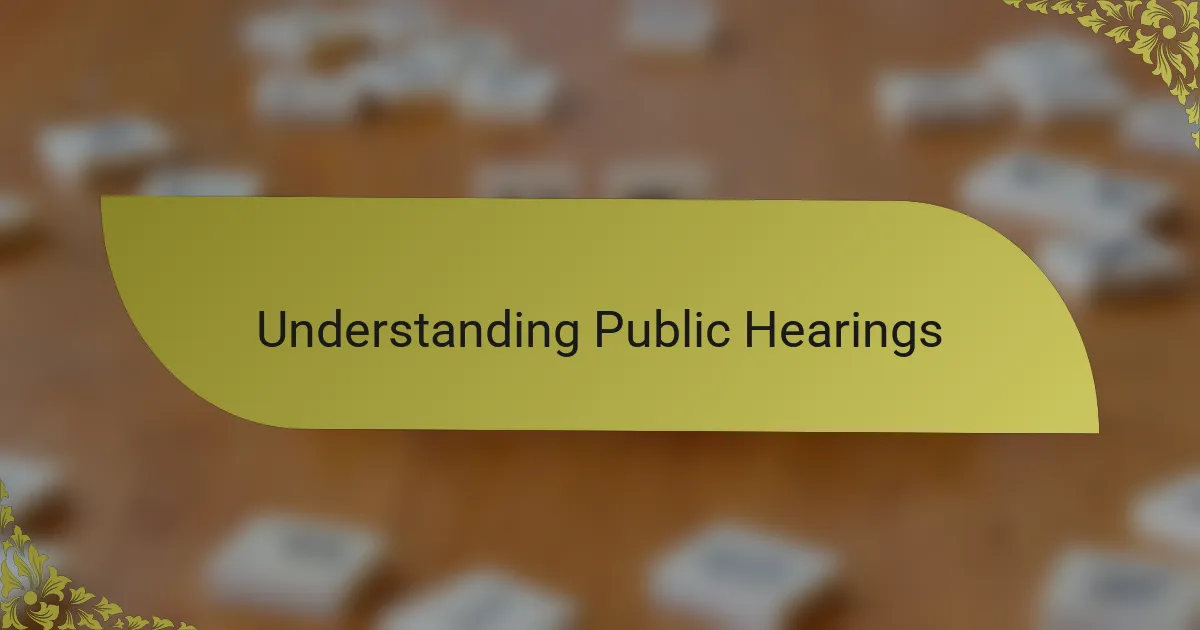
Understanding Public Hearings
Public hearings are essential forums where citizens can voice their opinions on issues that affect their communities. They serve as a platform for public engagement, allowing individuals to hear and be heard by decision-makers. I remember attending a local hearing about a proposed road development in my neighborhood. The atmosphere was charged with emotions, as residents lined up to share their concerns about safety and environmental impacts.
These meetings can often highlight the power of collective voices, making them an invaluable aspect of our democratic process. They provide an opportunity for transparency, ensuring that community members remain informed and involved. Here’s what to consider about public hearings:
- They are typically open to all community members, promoting inclusivity.
- Participants can present their views or concerns, often in a time-limited format.
- Hearings can address various topics, from environmental regulations to local ordinances.
- They offer a chance for lawmakers to gauge public sentiment before making decisions.
- Emotional testimonies can sway opinions and lead to changes in proposals.
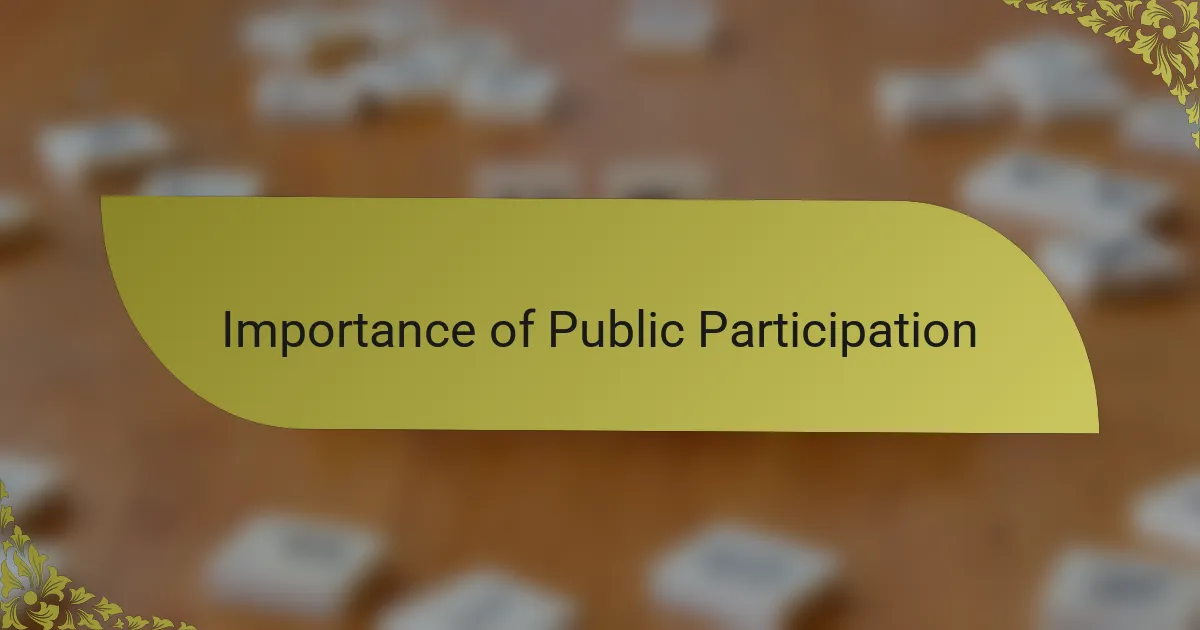
Importance of Public Participation
Public participation is critical in shaping our local policies and holding the government accountable. I’ve personally experienced moments in public hearings where the collective voice of citizens truly influenced decisions. It’s empowering to see how sharing personal stories can shift perspectives and lead to meaningful changes in our community.
When I attended my first public hearing, I was nervous but found it exhilarating to express my views. Seeing others share their passions made me realize the importance of our contributions. Each voice matters, and together, we can advocate for the issues that deeply resonate with us.
| Public Participation Benefits | Examples from My Experience |
|---|---|
| Enhances Transparency | In one hearing, community concerns compelled officials to clarify budget allocations. |
| Empowers Citizens | I learned that sharing my story about environmental concerns led to a new local initiative. |
| Encourages Community Engagement | The warmth of shared experiences reminded us that we are all in this together. |
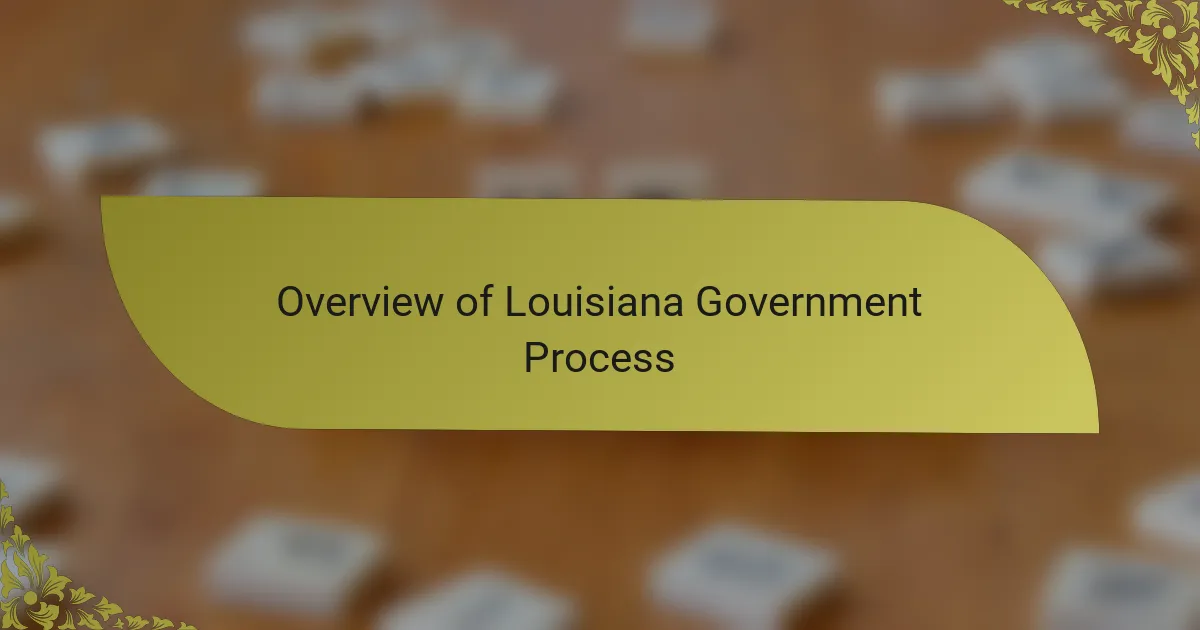
Overview of Louisiana Government Process
In Louisiana, the government process is unique, reflecting the culture and values of its citizens. The blend of civil law and political traditions creates a dynamic system that often feels personal to those involved. I’ve participated in public hearings where the discussions not only centered on proposed laws but also encompassed the heart of our communities, making every voice feel impactful.
Attending these hearings is an eye-opening experience. It’s intriguing to witness firsthand how various stakeholders, from local citizens to elected officials, engage in passionate conversations. Here are some key components of the Louisiana government process that I found particularly notable:
- Legislative Sessions: The Louisiana Legislature meets annually to discuss and create laws, with a session occurring in the spring and a regular one in the fall.
- Public Involvement: Citizens have the opportunity to voice their opinions at public hearings, allowing them to influence local governance.
- Committees: Specialized committees review proposed legislation, which allows for focused discussions on specific issues, reflecting community concerns.
- Voting Process: After thorough examination, bills are put to a vote within the legislature, and public involvement plays a crucial role in shaping these decisions.
It’s engaging to see how this process unfolds, as it truly reflects the voices of Louisiana’s vibrant communities.
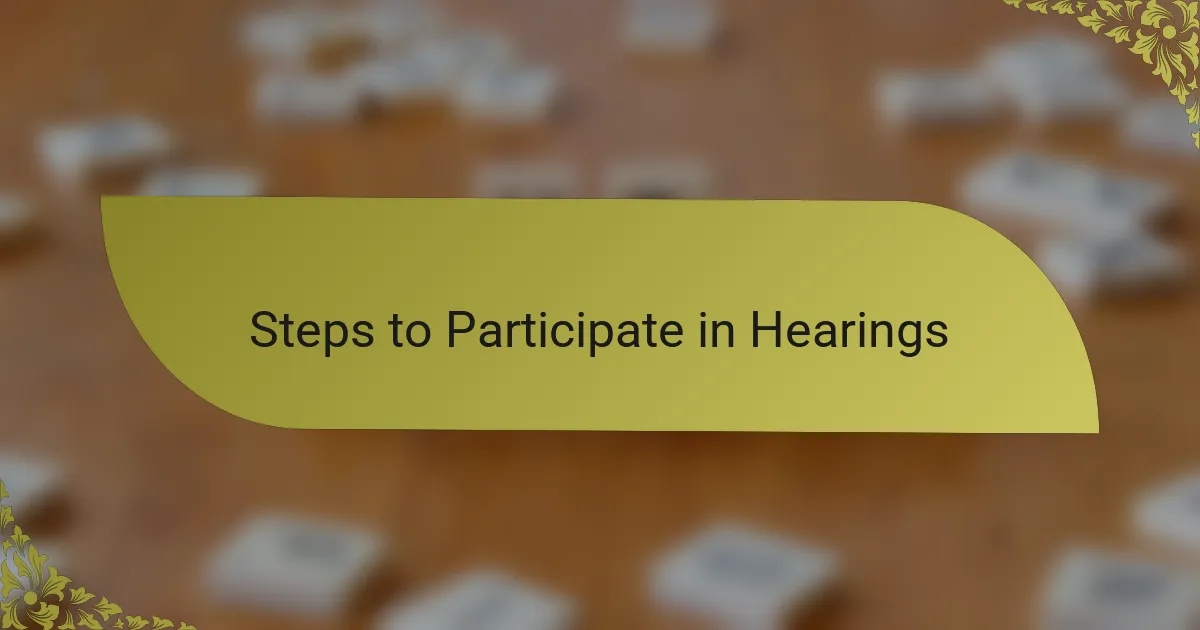
Steps to Participate in Hearings
Participating in public hearings can feel a bit daunting at first, but I’ve found it to be incredibly rewarding. The first step is to research the hearing agenda and understand the topics being discussed. I remember attending my first public hearing, feeling nervous but excited to have my voice heard. Engaging in the process not only empowered me but also made me feel connected to my community.
Here’s a concise guide for getting involved:
- Check the Schedule: Find out when hearings are taking place, which is often published on your local government’s website.
- Understand the Agenda: Review the topics and proposed changes to prepare insightful comments or questions.
- Register to Speak: Ensure you’re on the agenda; many hearings require advance registration to share your views.
- Prepare Your Statement: Take time to organize your thoughts. I often jot down key points and practice what I want to say.
- Attend with an Open Mind: Be ready to listen as much as you speak; the audience’s perspectives can be enlightening.
- Follow Up: After the hearing, connect with key stakeholders or officials. This helps to reinforce your engagement and shows that you’re invested in the outcome.
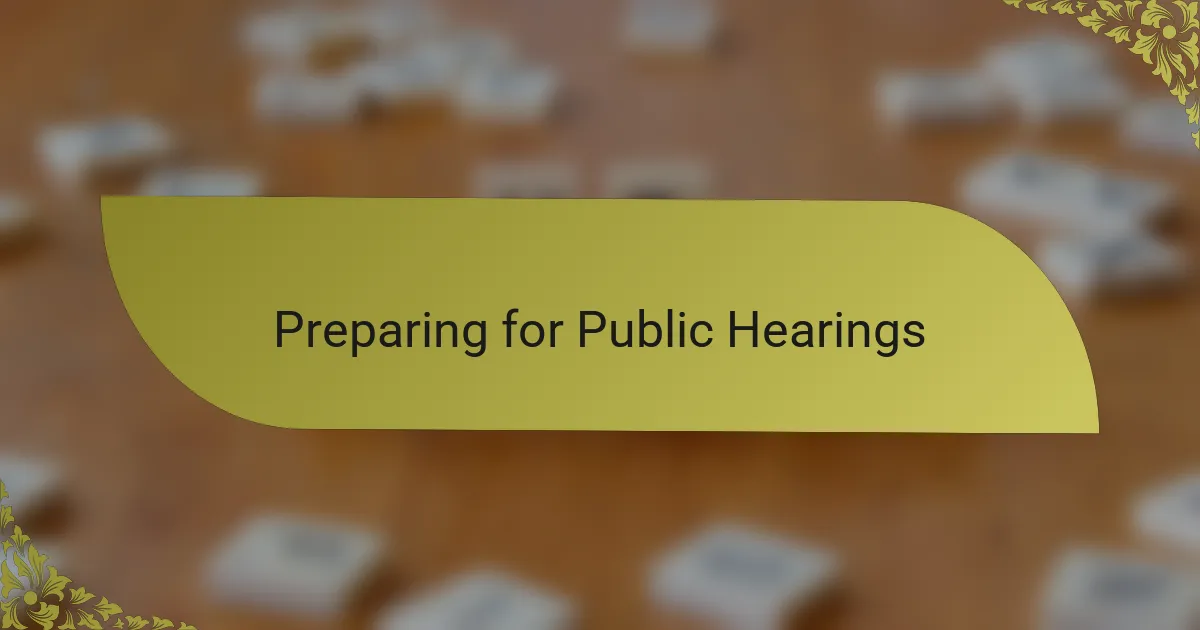
Preparing for Public Hearings
Preparing for public hearings can indeed feel overwhelming, but it’s a vital part of making your voice heard. One of the first things I do is to delve into the hearing agenda. Understanding the topics on the table is crucial. Have you ever walked into a meeting without knowing what to expect? It can be disorienting. I recall attending a hearing where I felt lost until I familiarized myself with the proposed changes.
Once I’ve grasped the agenda, I focus on crafting my statement. I often jot down key points and rehearse what I want to express. This simple preparation makes a massive difference when it’s my turn to speak. Isn’t it fascinating how organizing your thoughts can help convey your passion? I remember articulating my concerns about local environmental policies, feeling a sense of pride as my words resonated with others in the room.
Lastly, I emphasize registering to speak ahead of time. Many hearings require this, which ensures your voice can be part of the dialogue. I once missed out on sharing my views simply because I forgot this step, and it taught me a valuable lesson about planning. Having these elements in place not only empowers you but also connects you deeper with your community. Are you ready for your next public hearing?
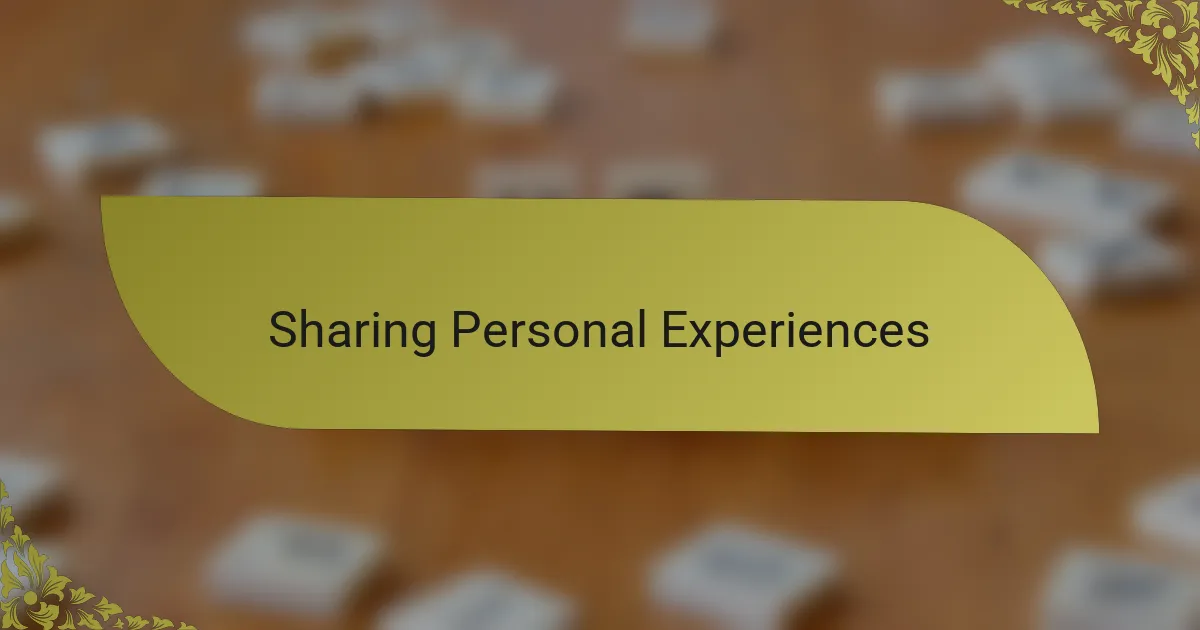
Sharing Personal Experiences
Participating in public hearings was a revelation for me. I remember the first time I stood at the podium, feeling a mix of excitement and nerves as I shared my views on a local zoning amendment. It was an empowering experience, and I realized how valuable it is to have your voice heard in local governance. The thrill of connecting with others passionate about community issues created an uplifting atmosphere that I will always cherish.
Reflecting on that experience, I’ve compiled a few key takeaways that I hope inspire others to engage in public hearings:
- Preparing your thoughts in advance boosts confidence.
- Listening to differing opinions broadens your perspective.
- Building a network of local activists enhances community support.
- Sharing personal stories makes a stronger impact on decision-makers.
- Remaining respectful, even when disagreeing, fosters a healthier dialogue.